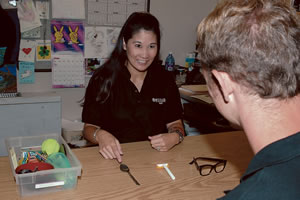Aphasia: Relearning Speech
Interviewed by Rasa Fournier
Wednesday - June 29, 2011
E-mail this story | Print this page | Comments (0) | Archive
 Del.icio.us Share
Del.icio.us Share

Dr. Kori C. Mizuta-Yamamoto
Speech-Language Pathologist At Rehabilitation Hospital Of The Pacific
Where did you receive your schooling and training?
At the University of Hawaii at Manoa.
How long have you been practicing?
I graduated in ‘97, so about 14 years.
What is aphasia?
Aphasia is a speech and language disturbance often following some kind of brain injury including stroke or traumatic injury. It can affect all areas of speech and language, which can include auditory (or listening) comprehension. It also affects vocal expression, written expression, reading comprehension, numerical reasoning and non-verbal communication - for example, the person might have difficulty using or understanding hand-body gestures or facial expression that we often use in communication.
What are the symptoms of aphasia?
A major hallmark would be word-finding difficulties. Particularly finding nouns - names of items or people that we commonly use/see every day. They may be able to use the objects appropriately, but can’t tell me, “Can you pass me my comb?”
So they can say part of the sentence, but they can’t identify the object?
Yes, at some levels. There are others who are much more severely affected and they have almost no intelligible speech to you and I. It may be jargon, it may be barely a sound.
Are there ways to help people who have severe forms of aphasia?
There are, but it’s a lot more challenging for both the patient and the family, as well as the therapist. We try to teach strategies - gestures, make a communication board or attempt augmentative communication with computer-based systems for some patients.

|
Can they ever completely recover?
Recovery is difficult to determine early on after an injury or stroke. We hope and we always try, but time will tell us what we’ll get back. There are people who surprise us - they work very hard, though. Families also help a lot with support, practice and patience.
How does the treatment process work?
There is a method that we follow to progress the patient through the areas of difficulties that they have - we call it working through the hierarchy. For example, with reading we might have to start off with identifying letters and the sounds that those letters make, and then we would start putting them together in short words and increase those words in length until we can get to phrases and sentences, and eventually maybe to paragraphs. And then more functional reading like a newspaper or magazine.
There are steps just like we learn in school. Oftentimes the information is there but the brain can’t access it, so we need to progress them step by step until the brain starts picking up on the skills.
Some people need to learn everything all over again. We’ll have a good day or we’ll have a bad day. On a good day we’ll be able to access what we need, and other days are not going to be that easy, so we teach a lot of strategies. Certain techniques work well for some patients and others not so well. So it’s basically trying different methods to see what will help that particular person.
Is there anything about aphasia patients that is unique to Hawaii?
The most notable things is that our culture is very diverse, so we have a lot of bilingual speakers or English as a second language. That presents a further challenge for somebody who has aphasia, because aphasia may not only affect any second language they’ve learned, it also can affect their primary language. That is always, of course, more difficult to work with if the therapist is not a speaker of that first language. We need to involve the families a lot in the therapy, so techniques can be carried over at home to help patients in both their primary language as well as English.
Is there anything else about aphasia that you’d like to mention?
Aphasia is extremely challenging and frustrating for the patient. They sometimes know what they would like to express, but they are just unable to do it. They are unable to find the words they want to use, or they know what they want to say, but the injury has affected the pathways between the different areas of the brain, which doesn’t allow the thought to be spoken by the mouth. While seeing them struggling is frustrating for the listener, we don’t want to talk for the patient. We need to give them time to communicate their thoughts. We cue or remind them to use their strategies taught in therapy such as writing or gesturing to help with communication. We also give them choices so that they can choose instead of just assuming what they want.
What keeps you inspired?
When communication is affected, it is difficult for the individual and the listener. As a therapist, you feel very much for the patient but you also want to empower them. They have other skills that they can use to help them with their communication as they improve. We are simultaneously building on those skills in therapy along with addressing any difficulties in the speech-language (or cognitive-linguistic) areas. You need to function and communicate somehow. I think what keeps us all going as therapists is when we see even the smallest victory and we can show the patient: This is where we were two weeks ago and this is where we are today; do you see the progress? And when the patient can tell us, “I could do this better today” or “I actually picked up the phone and talked to my brother on the Mainland,” those are big victories because maybe a month ago they could hardly say a few words.
E-mail this story | Print this page | Comments (0) | Archive
Most Recent Comment(s):













